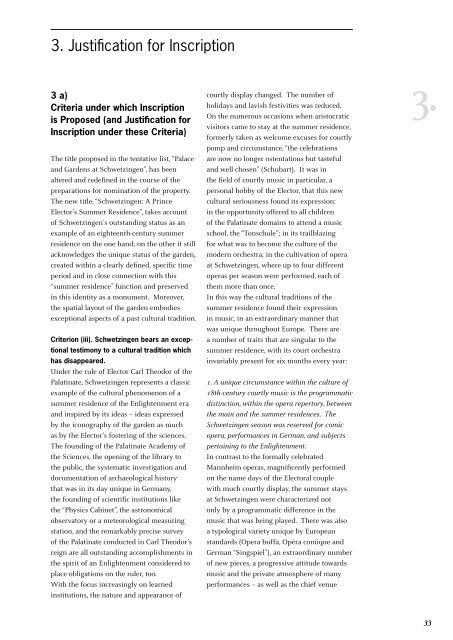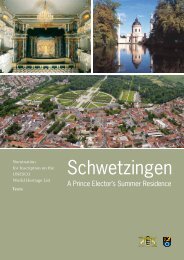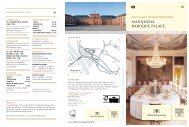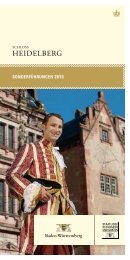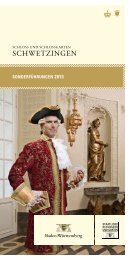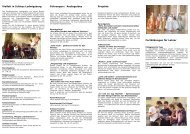3. - Schlösser-Magazin
3. - Schlösser-Magazin
3. - Schlösser-Magazin
Create successful ePaper yourself
Turn your PDF publications into a flip-book with our unique Google optimized e-Paper software.
<strong>3.</strong> Justification for Inscription<br />
3 a)<br />
Criteria under which Inscription<br />
is Proposed (and Justification for<br />
Inscription under these Criteria)<br />
The title proposed in the tentative list, “Palace<br />
and Gardens at Schwetzingen”, has been<br />
altered and redefined in the course of the<br />
preparations for nomination of the property.<br />
The new title, “Schwetzingen: A Prince<br />
Elector’s Summer Residence”, takes account<br />
of Schwetzingen’s outstanding status as an<br />
example of an eighteenth-century summer<br />
residence on the one hand; on the other it still<br />
acknowledges the unique status of the garden,<br />
created within a clearly defined, specific time<br />
period and in close connection with this<br />
“summer residence” function and preserved<br />
in this identity as a monument. Moreover,<br />
the spatial layout of the garden embodies<br />
exceptional aspects of a past cultural tradition.<br />
Criterion (iii). Schwetzingen bears an exceptional<br />
testimony to a cultural tradition which<br />
has disappeared.<br />
Under the rule of Elector Carl Theodor of the<br />
Palatinate, Schwetzingen represents a classic<br />
example of the cultural phenomenon of a<br />
summer residence of the Enlightenment era<br />
and inspired by its ideas – ideas expressed<br />
by the iconography of the garden as much<br />
as by the Elector’s fostering of the sciences.<br />
The founding of the Palatinate Academy of<br />
the Sciences, the opening of the library to<br />
the public, the systematic investigation and<br />
documentation of archaeological history<br />
that was in its day unique in Germany,<br />
the founding of scientific institutions like<br />
the “Physics Cabinet”, the astronomical<br />
observatory or a meteorological measuring<br />
station, and the remarkably precise survey<br />
of the Palatinate conducted in Carl Theodor’s<br />
reign are all outstanding accomplishments in<br />
the spirit of an Enlightenment considered to<br />
place obligations on the ruler, too.<br />
With the focus increasingly on learned<br />
institutions, the nature and appearance of<br />
courtly display changed. The number of<br />
holidays and lavish festivities was reduced.<br />
On the numerous occasions when aristocratic<br />
visitors came to stay at the summer residence,<br />
formerly taken as welcome excuses for courtly<br />
pomp and circumstance, “the celebrations<br />
are now no longer ostentatious but tasteful<br />
and well chosen” (Schubart). It was in<br />
the field of courtly music in particular, a<br />
personal hobby of the Elector, that this new<br />
cultural seriousness found its expression:<br />
in the opportunity offered to all children<br />
of the Palatinate domains to attend a music<br />
school, the “Tonschule”; in its trailblazing<br />
for what was to become the culture of the<br />
modern orchestra; in the cultivation of opera<br />
at Schwetzingen, where up to four different<br />
operas per season were performed, each of<br />
them more than once.<br />
In this way the cultural traditions of the<br />
summer residence found their expression<br />
in music, in an extraordinary manner that<br />
was unique throughout Europe. There are<br />
a number of traits that are singular to the<br />
summer residence, with its court orchestra<br />
invariably present for six months every year:<br />
1. A unique circumstance within the culture of<br />
18th-century courtly music is the programmatic<br />
distinction, within the opera repertory, between<br />
the main and the summer residences. The<br />
Schwetzingen season was reserved for comic<br />
opera, performances in German, and subjects<br />
pertaining to the Enlightenment.<br />
In contrast to the formally celebrated<br />
Mannheim operas, magnificently performed<br />
on the name days of the Electoral couple<br />
with much courtly display, the summer stays<br />
at Schwetzingen were characterized not<br />
only by a programmatic difference in the<br />
music that was being played. There was also<br />
a typological variety unique by European<br />
standards (Opera buffa, Opéra comique and<br />
German “Singspiel”), an extraordinary number<br />
of new pieces, a progressive attitude towards<br />
music and the private atmosphere of many<br />
performances – as well as the chief venue<br />
<strong>3.</strong><br />
33


